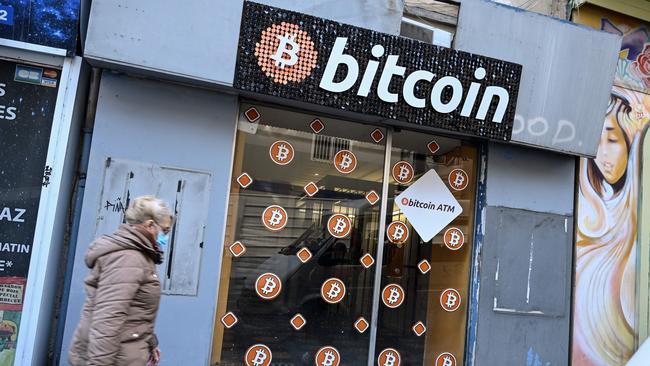Bitcoin’s here to stay, but the jury’s still out on its role in the global economy
If companies as diverse as Tesla and Westpac are investing in bitcoin related ventures, is it time for the private investor to join the party?

Most of us like the US dollar. It has lasted for centuries, survived two world wars, the Great Depression, and a siege by inflation. It works pretty well as a de facto global currency. Do we really need a purely digital alternative — one that isn’t backed by the Federal Reserve, lives only on a computer network, consumes vast quantities of electricity, and has no intrinsic value?
That profile describes bitcoin, of course, and it is having a moment.
With bitcoin’s market value topping $US1 trillion ($1.3 trillion) — following a 1000 per cent surge in the past year alone — it may be reaching an economic tipping point. Brokerages such as Morgan Stanley say that investors should add it to their portfolios. Companies like Tesla have bought large sums. A few taps on your phone can plop it in a digital wallet on PayPal, where it can be converted to cash to make a purchase. If you’d like to trade it, Square and Robinhood will oblige. Bitcoin debit cards are coming from Visa and Coinbase (where Westpac has an estimated $500m stake),
Yet if you’re wondering what bitcoin is — and whether you should own it — you’re not alone. Bitcoin and other cryptocurrencies are “mined” from a digital storage depot and pumped into circulation through a decentralised computer network called a blockchain. Prices for bitcoin, which sits atop an expanding crypto ecosystem, may be rising as retail and institutional investors snap up relatively thin supplies.
In a climate of fear over inflation and monetary debasement, proponents say that bitcoin will hold its value more than “fiat” currencies like the dollar, yen, or euro. Eventually, they argue, it will live in harmony with paper currencies in the global economy.
While the bitcoin genie may be out of the bottle, it’s far from omnipresent. Obstacles include technological hurdles, price instability, taxation policies, and governments that don’t want a freewheeling digital token usurping their monetary policies or financial regulations. Illicit uses of bitcoin, including money laundering and tax evasion, abound. Authoritarian governments have already cracked down. China, for instance, has become a leader in blockchain technology and mining, but bitcoin itself poses a threat: Beijing has banned banks and other financial firms from transacting in it, and shut down domestic crypto exchanges. Beijing is now rolling out a digital yuan, controlled by its central bank, partly to try and offset bitcoin’s appeal.
Another hurdle for bitcoin is finding ways to mine it without turning it into another global smokestack. The global bitcoin network now emits 60 million tonnes of carbon dioxide annually, roughly equivalent to countries such as Greece.
Perhaps the most vexing question is whether it’s a trillion-dollar bubble. Bitcoin’s market value has pushed it past that of Mastercard, Home Depot and Exxon Mobil combined. Cryptos overall are worth the entire high-yield bond market, according to Morgan Stanley.
Yet bitcoin acts more like a thinly traded stock than a liquid large-cap; most of the bitcoin that has been mined is owned by long-term HODLers — or those who “hold on for dear life” — and doesn’t actually circulate, and the price may be inflated by large purchases. Indeed, 95 per cent of all the bitcoins is controlled by 2.4 per cent of the accounts, according to BofA, and 20 per cent of the supply may be sitting in lost or stranded digital wallets, according to Chainalysis.
How bubbly is this market? I think it’s very bubbly,” says Carmen Reinhart, chief economist of the World Bank. “It may not take any melodrama in a thin market to reverse most or all of the price gains. It’s not like the Treasury market. We have to expect huge price volatility in bitcoin.”
Other economists argue that while bitcoin is an innovative technology with compelling uses, it lacks any intrinsic value to support its price. “Bitcoin is simply a word,” says Willem Buiter, the former chief economist for the European Bank for Reconstruction and Development. “It’s not something you can eat or touch, use as a consumer or producer for manufacturing.” Even gold, the closest analogy, has uses for jewellery and manufacturing. Worries about inflation and paper currencies losing value are legitimate, he says, and investors may want a hedge. “I’m just arguing that bitcoin isn’t it. It’s purely a speculative bubble.”
Still, bitcoin is also getting votes of legitimacy from some influential investors., and even those who say that bitcoin is a bubble think it’s likely to stay.
Bitcoin’s prices may simply be supported by the belief that it will one day give the US dollar a strong run. In other words, there’s no good reason to buy, unless you think the price is going up.
This is an edited version of a feature which first appeared in Barron’s.



To join the conversation, please log in. Don't have an account? Register
Join the conversation, you are commenting as Logout